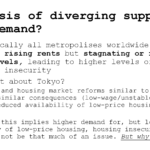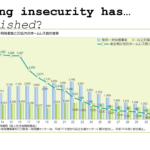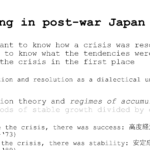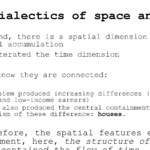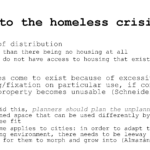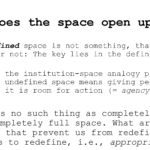
Download
Veranstaltungsort
DIJ (access) and online
Anmeldung
This is a past event. Registration is no longer possible.
DIJ Mailing Lists
Please subscribe below to stay informed about our research activities, events & publications:
Inhabiting the Interstice: the Regulation of Post-Bubble Housing Insecurity in Tokyo
15. Mai 2024
Lenard Görögh, Freie Universität Berlin
Before the speculative bubble in Japan’s real estate market burst in the early 1990s, Tokyo experienced what is now plaguing metropolitan areas around the world: Real estate prices skyrocketed without wage growth at all levels of society keeping pace. When the crisis hit, the city experienced unprecedented levels of homelessness. In response, labor and housing markets were subjected to neoliberal restructuring. But what created greater housing insecurity in other parts of the world seemed to have the opposite effect in Tokyo – the number of officially recorded rough sleepers dropped significantly. How could this be?
Based on a reevaluation of Japanese literature and a thorough analysis of government, industry, and business reports, backed up by in-depth interviews conducted with both entrepreneurs and residents during field research in 2019, this presentation outlined four case studies of fragile housing to examine the regulation of homelessness as an expression of Japanese capitalism in crisis. By situating changes in the welfare regime, housing market institutions, residential architecture, and family models in the broader context of industrial transformation, the presentation outlined how tendencies that we observe at the macro level are mediated at the meso and micro levels. This makes it possible to describe what the change in housing means for people in concrete terms, but also to understand its role in the stabilization of the political economy in more abstract terms. As a transdisciplinary object of inquiry, housing not only constitutes a necessary focus for policymakers, but also a compelling case for bridging diverse literatures ranging from political economy and the welfare state to human geography, urban planning, and even architecture. This multifaceted character presents both a formidable challenge and a promising opportunity for social scientists to theorize the complex interplay of space and time.
The talk was attended by 30 people online and in person. The Q&A session focused on different aspects of homelessness, including difficulties of defining homelessness and of criteria who is recorded in official statistics. It also discussed the role of empty houses (akiya) in Japan and in how far the housing and homelessness situation in Tokyo can be compared to that in other Japanese cities and in metropoles in different parts of the world.
Lenard Görögh is a PhD candidate in the Department of Japanese Studies at Freie Universität Berlin. After completing his MA in Political Science and Japanese Studies, he began to focus on the housing market and sociology of housing which he tries to understand using theories of Political Economy. He is particularly interested in the Tokyo metropolitan region.
